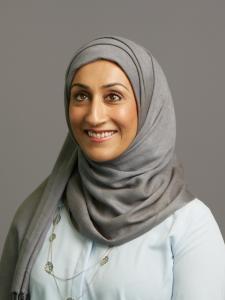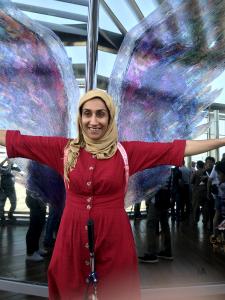Retina UK
Sumaira Latif, 43, from Surrey explains how Retina UK helps to support those who have inherited progressive sight loss
Sumaira was just four years old when she noticed her field of vision had started to narrow and get fuzzy. “It was like looking through a glass window that gets dirtier over time. I was very young, so didn’t really know what was happening and just accepted it as my reality, but I started to get labelled as the clumsy one, or was accused of not paying attention when I walked into things or tripped.”
When Sumaira was five years old, her parents noticed her then-six-year-old brother was also displaying similar symptoms. They took them to see an ophthalmologist at the eye hospital in Glasgow, who did a series of eye and blood tests. “The doctor explained to my parents we both had retinitis pigmentosa (RP), which is an inherited eye condition that involves a breakdown and loss of cells in the retina at the back of the eye, which gradually stops it from working. My parents were devastated, as there was no treatment and they knew we were going to lose our vision. Because my brother and I were very young, we didn’t really understand the discovery, or the impact it would have on our lives.”
Sumaira’s mum discovered there was a one in four chance of her children developing the condition. Sumaira’s younger brother – who is five years her junior – was also later diagnosed with the condition, meaning three out of five siblings were affected. “It was very difficult for my parents, as they had seen how it had affected us, so they knew what my brother would go through in a few years’ time.”
Over the next few years, Sumaira’s vision continued to decline. “At first I could read very slowly – like four or five words a minute – but by the time I was 16 I couldn’t read at all. I learned braille and used cassette tapes to record information. I was able to attend a mainstream secondary school with one-to-one support, but there were lots of challenges.
“I was worried I may not be able to get married, have children, or get a job, because I was blind and felt different”
“Being blind impacted me socially. I felt I never really fitted in and that people were uncomfortable around me. As I progressed with my education, I would also have to convince people I was able to learn and find new ways to access and record information. Growing up, I just wanted to be ‘normal’ and worried about not being able to get married, have children, or get a job. All those things felt like they weren’t attainable for me, because I was blind and felt different and excluded from my peer group.”
“I experienced a lot of discrimination, because people didn’t want the hassle of employing someone who was blind. I had to be focused, determined and develop a very thick skin”
After leaving education, Sumaira discovered new challenges when trying to find work. “It was really hard and I experienced a lot of discrimination, because people were uncomfortable with disability and didn’t want the hassle of employing someone who was blind. I had to be extremely focused, determined and develop a very thick skin.”
However, Sumaira persevered in creating a life of which she is now proud. “About 20 years ago I came across a big consumer goods company who were looking to employ people with disabilities, so I applied. I was given the job and have been there ever since. I also married my husband, Joe, several years ago and we now have three children together.
“I travel internationally a lot for work and have found that I am able to get support when I need it at airports and hotels. New technology has also made life so much easier and everything so much more accessible. I can use it to read out electronic text such as emails, and use Amazon’s Alexa to listen to books or find out information without having to press a button. I love that this technology is the same for everyone and accessible for all, so it makes me feel part of society.”
A couple of years ago, Sumaira heard about the charity Retina UK, which supports people affected by inherited progressive sight loss and invests in medical research.
“I got in touch and offered to volunteer for the charity, offering peer support to others affected by my condition. Since then I have been linked with two individuals in their late teens and twenties who are just starting to lose their sight. It’s a really emotional time for them, to know that as adults they are going to become blind, so to be connected to someone like me, who knows what they are going through and can offer them reassurance and advice over the phone, is really helpful. Often I’m the first person with the same condition they may speak to, so it’s good for them to hear I live a full life and to know life doesn’t stop when you go blind.
“Or course the day to day reality of being blind is difficult – integrating into society, getting around and getting things done. But the more hacks and tricks you can find to solve a problem, the easier it is, and I’m able to share the ones I’ve found for others to use.”
Sumaira has also found Retina UK to be a great source of support. “Being a volunteer is really rewarding, as it’s great to be able to help someone who is going through what you’ve been through. The charity has also been helpful in keeping me updated on what’s going on in the medical field and connecting me with other people with similar conditions.
“Being connected to others in the same situation helps a lot, because you learn and share with each other and become part of a group of people who understand what you’re going through. It is good to know there are others out there living their lives and overcoming challenges, and to know there is an organisation standing for your condition. Knowing they are there funding life-changing research and offering vital support is a great source of hope for us all.”
Funding vital research into inherited retinal conditions
TOTAL RAISED: £31,508
➸ Retina UK will use the money raised in the Candis Big Give to fund research into inherited retinal conditions. Funds will be invested into the most promising medical research projects currently taking place, helping to increase understanding of inherited retinal conditions and lay the foundations for future treatments to halt or reverse sight loss.
➸ Visit retinauk.org.uk or phone 0300 111 4000 to find out more.
How Buying a Subscription Helps – In 2020, Candis Club will donate at least £250,000 from members’ magazine subscription revenue to health charities taking part in The Candis Big Give.
Any additional funds will go tocharities at the discretion of the General Committee of Candis Club.




Leave a Reply
Please login or register to leave a comment.